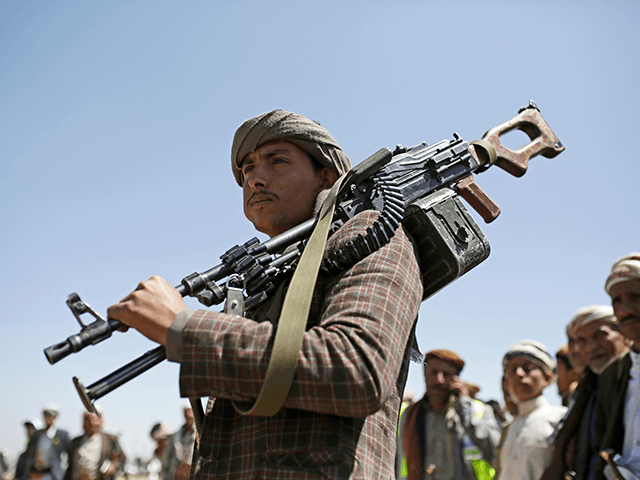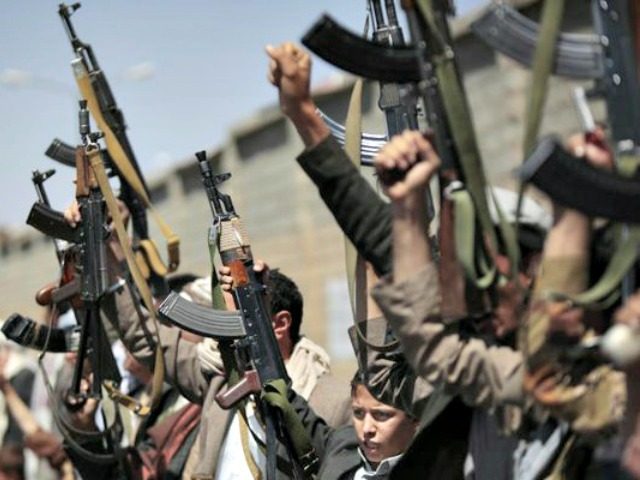The Iran-backed Houthi insurgents of Yemen, delisted as terrorists by President Joe Biden as one of his first acts in office, launched a massive terrorist strike on Saudi oil facilities and water desalination plants on Sunday.
Saudi officials said the Houthi attack targeted two petroleum distribution terminals, a natural gas plant, and an oil refinery. The targets were spread between several cities, including the Saudi capital of Riyadh and the major Red Sea port of Jeddah.
The Saudi military coalition said the Houthi attack involved cruise missiles made in Iran. The coalition said its air defenses intercepted many of the Houthi weapons, but Saudi state media carried photos and videos of fires and explosive damage from the missiles that made it through.
The coalition also charged the Houthis with launching at least 106 explosive-laden boats in an effort to compromise freedom of navigation in the Red Sea. The coalition said it was able to destroy most of these bomb boats, “protecting shipping lines and global trade.”
One of the Houthi missile strikes started a “limited fire” in a tank at the Jeddah distribution plant for Saudi Aramco, the national oil company. The fire was brought under control without loss of life
Another strike damaged a natural gas plant and refinery in the city of Yasref. The Saudi Energy Ministry said on Sunday the assault on Yasref “has led to a temporary reduction in the refinery’s production, which will be compensated for from the inventory.”
Aramco officials said the attacks did not cause enough damage to seriously disrupt gas and petroleum supplies, but the state-run Saudi news agency SPA on Monday quoted a Foreign Ministry source that said the Saudis would not be held responsible for disruptions to the already-stressed world oil market caused by Houthi attacks.

A Shiite Houthi tribesman holds his weapon during a tribal gathering showing support for the Houthi movement, in Sanaa, Yemen, Saturday Sept. 21, 2019. (AP Photo/Hani Mohammed)
The Foreign Ministry source warned that continued drone and missile attacks “will affect the kingdom’s production capacity and its ability to fulfill its obligations, which undoubtedly threatens the security and stability of energy supplies to global markets.”
The Houthi attack – a major escalation of the insurgency’s conflict with Saudi Arabia, and one of the heaviest salvos it has launched against Saudi targets since the beginning of the Yemeni civil war – came after several days of intense diplomacy in Oman, where U.N. special envoy Hans Grundberg met with Houthi negotiators to discuss “a possible truce during the holy month of Ramadan.” Ramadan begins on April 2 this year.
White House National Security Adviser Jake Sullivan condemned the Houthi strikes on Sunday as “terrorist attacks” and complained about the insurgency constantly using such violent actions to sabotage peace negotiations.
“These attacks reportedly targeted water treatment facilities as well as oil and natural gas infrastructure. The Houthis launch these terrorist attacks with enabling by Iran, which supplies them with missile and UAV components, training, and expertise. This is done in violation of U.N. Security Council resolutions prohibiting the import of weapons into Yemen,” Sullivan said.
“Saudi Arabia and the Yemeni Government have endorsed multiple U.N. calls for ceasefires and de-escalation over the last year. The Houthis have rejected these calls, responding instead with new offensives in Yemen and terrorist acts, such as those launched against Saudi Arabia last night,” he complained.
The Houthis were listed as terrorists by the Trump administration, but this designation was rescinded in the early days of the Biden administration, which has frequently complained about Houthi terrorism over the ensuing year.
The Biden administration has stubbornly resisted calls to relist the Houthis as a foreign terrorist organization, including advice from some White House officials. Resistance to reclassifying the Houthis as terrorists ostensbily flows from human rights advocates who fear the enraged insurgents would interfere with the delivery of humanitarian aid, but some critical observers believe the Biden administration is also worried about disrupting its nuclear deal negotiations with the Houthis’ patrons in Iran.

COMMENTS
Please let us know if you're having issues with commenting.